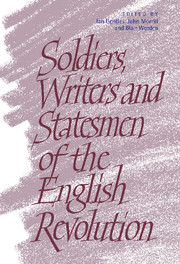Book contents
- Frontmatter
- Contents
- Preface
- Austin Woolrych: an appreciation
- 1 Secret alliance and Protestant agitation in two kingdoms: the early Caroline background to the Irish Rebellion of 1641
- 2 Of armies and architecture: the employments of Robert Scawen
- 3 George Digby, Royalist intrigue and the collapse of the cause
- 4 The iconography of revolution: England 1642–1649
- 5 The casualties of war: treatment of the dead and wounded in the English Civil War
- 6 ‘A bastard kind of militia’, localism, and tactics in the second civil war
- 7 Cromwell's commissioners for preserving the peace of the Commonwealth: a Staffordshire case study
- 8 Colonel Gervase Benson, Captain John Archer, and the corporation of Kendal, c. 1644—c. 1655
- 9 Repacifying the polity: the responses of Hobbes and Harrington to the ‘crisis of the common law’
- 10 Equality in an unequal commonwealth: James Harrington's republicanism and the meaning of equality
- 11 John Milton and Oliver Cromwell
- 12 From pillar to post: Milton and the attack on republican humanism at the Restoration
- 13 ‘They that pursew perfaction on earth …’: the political progress of Robert Overton
- 14 Locke no Leveller
- A bibliography of the writings of Austin Woolrych, 1955-95
- Index
11 - John Milton and Oliver Cromwell
Published online by Cambridge University Press: 10 November 2009
- Frontmatter
- Contents
- Preface
- Austin Woolrych: an appreciation
- 1 Secret alliance and Protestant agitation in two kingdoms: the early Caroline background to the Irish Rebellion of 1641
- 2 Of armies and architecture: the employments of Robert Scawen
- 3 George Digby, Royalist intrigue and the collapse of the cause
- 4 The iconography of revolution: England 1642–1649
- 5 The casualties of war: treatment of the dead and wounded in the English Civil War
- 6 ‘A bastard kind of militia’, localism, and tactics in the second civil war
- 7 Cromwell's commissioners for preserving the peace of the Commonwealth: a Staffordshire case study
- 8 Colonel Gervase Benson, Captain John Archer, and the corporation of Kendal, c. 1644—c. 1655
- 9 Repacifying the polity: the responses of Hobbes and Harrington to the ‘crisis of the common law’
- 10 Equality in an unequal commonwealth: James Harrington's republicanism and the meaning of equality
- 11 John Milton and Oliver Cromwell
- 12 From pillar to post: Milton and the attack on republican humanism at the Restoration
- 13 ‘They that pursew perfaction on earth …’: the political progress of Robert Overton
- 14 Locke no Leveller
- A bibliography of the writings of Austin Woolrych, 1955-95
- Index
Summary
There were two occasions when the imagination of John Milton, the supreme writer of the Puritan Revolution, focused on Oliver Cromwell, its supreme soldier and statesman. There is the sonnet ‘To the Lord General Cromweir in May 1652; and there is the passage about Cromwell in Milton's Latin prose work Defensio Secunda, published in May 1654, when Cromwell had been Lord Protector for six months. Both the sonnet, an exercise in verse, and the passage of prose, an exercise in eloquence, are tributes of praise. Milton honours Cromwell's stature, which elicits and affirms the poet's own. Art and power meet and pay homage to each other.
Yet after Defensio Secunda Milton's writings never mention Cromwell's name again. During the remaining four years of Cromwell's life they pass no explicit comment on his government. Milton's pen offers no tribute to the military and naval exploits of the protectorate, no lament on Cromwell's death. His silence is loud. In August 1659, four months after the fall of Richard Cromwell and of the protectorate, the silence was broken. Now Milton described the Cromwellian regime as ‘a short but scandalous night of interruption': interruption, that is, of the Long Parliament, which Cromwell had expelled by force in April 1653. The significance and bitterness of that attack have been brought out by Austin Woolrych in much the most authoritative and penetrating account of Milton's attitudes to Cromwell that we have. How do we reconcile the attack with Milton's earlier praise of Cromwell? Did Milton undergo, between 1654 and 1659, a change of heart? Or can we find, in his feelings about Cromwell, a thread of continuity? I believe we can.
- Type
- Chapter
- Information
- Soldiers, Writers and Statesmen of the English Revolution , pp. 243 - 264Publisher: Cambridge University PressPrint publication year: 1998
- 9
- Cited by



